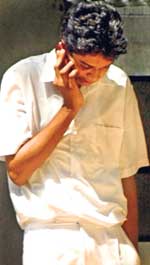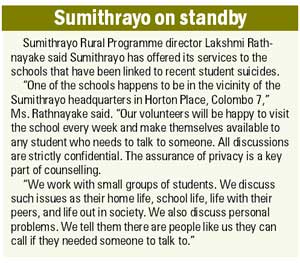Over the past two weeks, six schoolchildren attempted suicide, and two succeeded. In all six cases the suicides were triggered by school-related incidents. This has given rise to widespread concern about what is happening in the country’s schools, and whether principals and teachers know how to handle young people.
 The Sri Lanka Sumithrayo is a government-sponsored welfare association dedicated to suicide prevention. The association is manned by volunteers trained in counselling. They are available to talk to troubled persons, especially those feeling suicidal. The association conducts islandwide awareness-raising programmes in cities, towns and rural areas, including schools. The Sri Lanka Sumithrayo is a government-sponsored welfare association dedicated to suicide prevention. The association is manned by volunteers trained in counselling. They are available to talk to troubled persons, especially those feeling suicidal. The association conducts islandwide awareness-raising programmes in cities, towns and rural areas, including schools.
According to Lakshmi Rathnayake, director of the Sumithrayo Rural Programme, most city schools do not have dedicated counselling programmes for young people with emotional, personal or family problems. This is a serious deficiency in the country’s education system, she said.
“Teenagers and young adults are impressionable and sensitive, and especially vulnerable to social and peer pressure,” Ms. Rathnayake said. “We noticed that urban schools tend to be less receptive than rural schools to the Sumithrayo counselling programmes. Most city schools say their students don’t have problems and therefore don’t need counselling, while others say the parents would not approve.”
Some schools, however, have invited Sumithrayo to conduct awareness-raising programmes for their students.
Last week’s student suicide highlighted a widespread problem, according Mrs. Rathnayake, who says there has been a surge in suicide attempts. “While the number of suicides has dropped, the number of suicide attempts has gone up,” she said. “Attempted suicides are no longer considered a criminal offence, and therefore they go unrecorded and don’t get into the news.
“I work actively in the field, so I know firsthand about the suicide attempts of young people. Children as young as seven or eight years have attempted suicide. This is a serious problem.”
The factors that cause people to take their lives vary from case to case, but social pressures and economic problems are the usual suspects. In the case of teenagers, social and peer pressure are the most common causes for suicide, as was seen in the recent student suicides.
 “Under the present social conditions, children in their early teens are under tremendous pressure. They are exposed to all kinds of influences. Communication and proper guidance are key to helping them.” “Under the present social conditions, children in their early teens are under tremendous pressure. They are exposed to all kinds of influences. Communication and proper guidance are key to helping them.”
Mrs. Rathnayake said a child can easily crack under pressure if caught in a socially embarrassing situation and threatened. “The adults should be sensitive in their handling of young people. They should think of the individual they are dealing with. Some children are more sensitive than others. There is also the child’s background to consider. Some children have very strict parents who would react badly if they heard their children had misbehaved at school and been threatened with disciplinary action. The idea is to guide a child along the correct path, not punish him or her.”
According to leading educationist Jesima Ismail, the school is an enabling environment that prepares young people for the adult world. “Psycho-social counselling should be a part of the curriculum,” Ms. Ismail said. “A teacher should be many things to their students – mentor, counsellor, and friend. Schools should nurture a democratic environment. The children should feel they can trust their teachers. They should have the confidence to approach them.”
According to Jagath Wellawatte, chairman of the National Child Protection Authority, teenagers are adolescents and therefore especially sensitive and vulnerable. Parents and teachers should handle them with extra sensitivity and understanding.
“Adults and children can handle pressure, but teenagers are different,” Mr. Wellawatte explained. “They are going through dramatic biological and psychological changes, and it can be a very difficult time for them. Teenagers are often extra defensive or aggressive, and quick to react. Adults and teachers should understand this.
“Adolescents are experiencing adult emotions. Love and sex are very much on their minds at this time in their lives. Teachers should be very careful about the way they handle teenagers,” he said.
According to S. U. Wijeratne, acting secretary to the Ministry of Education, the government, with the help of UNICEF, has set up psycho-social centres at many Colombo schools. “We have asked the principals of the city schools to appoint teachers to counsel students who need help,” Mr. Wijeratne said. “Most trained teachers have a background in education psychology.” |

 The Sri Lanka Sumithrayo is a government-sponsored welfare association dedicated to suicide prevention. The association is manned by volunteers trained in counselling. They are available to talk to troubled persons, especially those feeling suicidal. The association conducts islandwide awareness-raising programmes in cities, towns and rural areas, including schools.
The Sri Lanka Sumithrayo is a government-sponsored welfare association dedicated to suicide prevention. The association is manned by volunteers trained in counselling. They are available to talk to troubled persons, especially those feeling suicidal. The association conducts islandwide awareness-raising programmes in cities, towns and rural areas, including schools. “Under the present social conditions, children in their early teens are under tremendous pressure. They are exposed to all kinds of influences. Communication and proper guidance are key to helping them.”
“Under the present social conditions, children in their early teens are under tremendous pressure. They are exposed to all kinds of influences. Communication and proper guidance are key to helping them.”